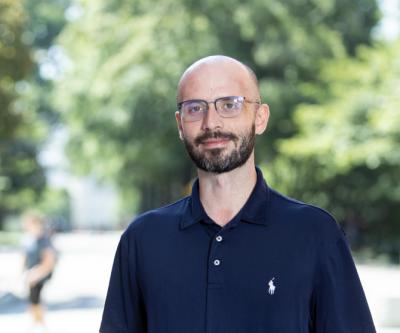John Wandelt



Karl I. Jacob, a professor of Materials Science and Engineering with a joint appointment in the G. W. Woodruff School of Mechanical Engineering, teaches graduate and undergraduate courses on polymer physics and engineering, rheology, and mechanics of polymeric materials. His graduate work was in the area of numerical analysis of vibrating three-dimensional structures. He came to Georgia Tech from DuPont Corporation in 1995. His initial work at the DuPont Dacron Research Laboratory was in the area of fiber-reinforced composite materials and in the development and modeling of fiber spinning processes. He then moved to the DuPont Central Research and Development Department, where he was involved in molecular modeling, computational chemistry, and diffusion.
Jacob is a member of the American Academy of Mechanics, the American Society of Mechanical Engineers, the Sigma Xi Research Society, and the Phi Kappa Phi Honor Society.
"Dr. Jacob's research is directed at stress induced phase changes, nanoscale characterization of materials, synthesis of polymeric nanofibers, mechanical behavior of fiber assemblies (particularly related to biological systems and biomimitic systems), nanoparticle reinforced composites, transdermal drug delivery systems, large scale deformation of rubbery (networked) polymers, and nanoscale fracture of materials. The objectives in this work, using theoretical, computational and experimental techniques, is to understand the effect of micro- and nano- structures in the behavior of materials in order to try to design the micro/nano structures for specific materials response. Dr. Jacob plans are to continue current research interests with a multidisciplinary thrust with more emphasis in bio related areas and to start some work on the dynamic behavior of materials and structures. Graduate students could benefit from the interdisciplinary nature of the work combining classical continuum mechanics with nanoscale analysis for various applications, particularly in the nano and bio areas. Dr. Jacob has extensive experience in vibrations and stability of structures, mechanics of polymeric materials, behavior of fiber assemblies, stress-induced phase transformation, diffusion, and molecular modeling. His research involves the application of mechanics principles, both theoretical and experimental, in the analysis and design of materials for various applications.";Fibers; smart textiles; fuel cells; Polymeric composites

Christine Robinson comes to IPaT with over 20 years of executive administrative experience. As a former USG employee, she worked at Georgia State University in the Andrew Young School for Policy Studies Dean’s Office as the administrative specialist. She also served as one of the former Directors of The Non-Profit Leadership Alliance at Georgia State. Christine relocated to Atlanta from Charlotte, NC and enjoys writing poetry and creating custom candles. Christine joined IPaT’s administrative team to assist with the day-to-day operations of the unit, direct support of unit management including coordinating calendars, meetings and assisting with events and procurement.

Walter Rich is a research communications program manager in Georgia Tech's Institute Communications supporting the Institute for People and Technology and Georgia Tech research communications.

Hyde is an associate professor in the School of History and Sociology at the Georgia Institute of Technology. He is a quantitative scholar whose main research areas are stratification and inequality, urban sociology, work and occupations, climate and disaster resilience, and immigration. He is currently conducting research on the effects of race/ethnicity and immigration status on homeownership, social and demographic change in Clarkston, GA (known as the most diverse square mile in America), and Principal Investigator for the Youth Advocacy for Resilience to Disasters Program research project funded by the National Science Foundation's Civic Innovation Challenge. He has also been principal investigator for a National Science Foundation Innovation Corps (I-Corps) grant. He received his Ph.D. from the Department of Sociology at the University of Connecticut and has published research articles in journals like Social Science Research, Research in Social Stratification and Mobility, Social Currents, Environmental Sociology, Social Indicators Research, City & Community, and Sociological Perspectives. Hyde serves as a Georgia Tech Institute for People and Technology initiative lead for research activities related to responsible and ethical technologies.

Dr. Sitterle is a Principal Research Engineer at the Georgia Tech Research Institute (GTRI), where her technical work synthesizes systems science, complex systems, and defense analysis. She is an expert with over 20 years of experience in engineering science, integrating engineering, natural, and physical sciences leading to the design and analysis of systems. Her primary areas of focus are identifying driving influences in support of materiel development under uncertainty, and integrating defense operational needs with systems sciences across multiple domains to supports design and assessment of defense systems and operational and tactical concepts of employment in theater environments. Dr. Sitterle also serves as the Chief Scientist for the Systems Engineering Research Division within the Electronic Systems Laboratory in GTRI. In this role, she supports the definition and execution of R&D across the main pillars of model-based approaches, human systems, and digital transformation of systems engineering to provide new capabilities and advance stakeholders’ decision-making processes. She also serves as a current member of the Research Council for the Systems Engineering Research Center (SERC), a DoD UARC led by Stevens Institute of Technology.

Michael Hoffmann is a Professor for Philosophy in the School of Public Policy at Georgia Tech. He is the Director of the Reflect! Lab, Co-Director of ETHICx, the Ethics, Technology, and Human Interaction Center, and he directs the VIP Digital Deliberation. He is doing research in three areas. In political philosophy, he focuses on the question of how democratic institutions should be designed that strengthen democracy. In AI ethics, he works on participatory design for human well-being. And across multiple disciplines he develops methods and collaborative software tools to support deliberation, argumentation, and consensus-building, as well as instruments to assess the skills and dispositions needed for these activities.

Noah Posner is a research scientist with the Institute for People and Technology and lab manager of the Interactive Product Design Lab (IPDL) in the School of Industrial Design. His focus is on creating interactive experiences that leverage physical interaction. He holds degrees in Industrial Design, Mechanical Engineering and an M.S. in Human Computer Interaction. His research involves creating rich physical interactions, designing and fabricating interactive devices using CAD and Rapid prototyping technologies, and developing educational tools for STEAM leaning that focus on utilizing hands on learning with intentionally designed artifacts. He also teaches courses in Physical Prototyping for Human Computer Interaction and Industrial Design.

Justin B. Biddle is an Associate Professor in the School of Public Policy at the Georgia Institute of Technology. His research interests are interdisciplinary in nature, drawing on fields such as philosophy of science, technology, and medicine; ethics of emerging technologies, and science and technology policy. Conceptually, his research explores the relationships between three sets of issues: (1) the role of values in science, technology, and medicine; (2) the epistemic implications of the social organization of research, and (3) ethics and policy. He is currently exploring these relationships in artificial intelligence (AI) and machine learning. He has also worked in the areas of biomedical research and agricultural biotechnology. He received a MA and PhD in History and Philosophy of Science from the University of Notre Dame and was later a Distinguished Fellow at the Notre Dame Institute for Advanced Study. Prior to arriving at Georgia Tech, he was a postdoctoral fellow in the Department of Philosophy at Bielefeld University in Germany.
Academic Specialty: Ethics in Technology

Matt works with Georgia Tech researchers and students, along with industry partners in the creation of innovative mobile and converged applications and services. He is also the Associate Director, and co-founder, of the Georgia Tech Research Network Operations Center, a unique research center supporting industry and student engagement through research and operational projects; and the wireless services manager for Georgia Tech in the Office of Information Technology. Matt is a principal in the annual Convergence Innovation Competition, now in its ninth year, which provides industry sponsors an opportunity to engage students in wide ranging categories which they define and judge. Matt is also responsible for The GT Journey project which includes GT mobile, an HTML5 based portal for mobile, desktop, and kiosks; and GT DevHub where any member of the campus community can access campus IT services and contribute content, meta-data, and the applications themselves.
Mobile Applications